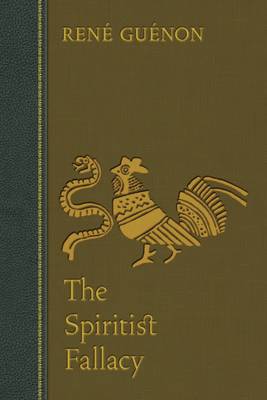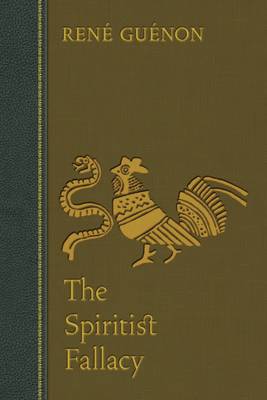
- Afhalen na 1 uur in een winkel met voorraad
- Gratis thuislevering in België vanaf € 30
- Ruim aanbod met 7 miljoen producten
- Afhalen na 1 uur in een winkel met voorraad
- Gratis thuislevering in België vanaf € 30
- Ruim aanbod met 7 miljoen producten
Omschrijving
Many readers of Guénon's doctrinal works have hoped for translations of his detailed exposés of Theosophy and Spiritism. Sophia Perennis is pleased to make available both of these important titles as part of the Collected Works of René Guénon. Whereas Theosophy: History of a Pseudo-Religion centers primarily on historical details, The Spiritist Fallacy, although also packed with arcane facts, is unique in revealing how one of the greatest metaphysicians of our age interpreted the phenomena, real or alleged, of Spiritism. The doctrinal expositions that accompany his astonishing account of Spiritism offer extraordinarily prescient insight into many deviations and "psychological" afflictions of the modern mind, and should be as valuable to psychiatrists and spiritual counselors as to students of esoteric history. And it also offers a profound corrective to the many brands of New Age "therapy" that all too unwittingly invoke many of the same elements whose nefarious origins Guénon so clearly pointed out many years ago.
Since WW II, "channeling" has largely replaced older styles of mediumship in the movement loosely known as the New Age. Yet the two are intimately related. As both historical chronicle and metaphysical critique, The Spiritist Fallacy, together with its companion volume, Theosophy: History of a Pseudo-Religion, is a valuable study of New Age origins. Guénon takes the "spirit manifestations" of the Fox sisters in Hydesville, New York (in 1847) as his starting-point, but while accepting the reality of many such "manifestations," denies that they represent the spirits of the departed. He sees them, rather, as fostering belief in a kind of rarefied materialism-a belief widespread today in popular culture. And he addresses the strange fact that "manifestations" associated from antiquity with haunted houses suddenly, in the nineteenth century-and within five years of their appearance-spawned an international pseudo-religious movement, speculating that certain magicians (possibly from the Hermetic Brotherhood of Luxor) may have intentionally produced the Hydesville phenomena by actively projecting hidden influences upon the passive psyches of their mediums. The Spiritist Fallacy is both an exposé of "unconscious Satanism" and a highly useful critique of the false ideas of the afterlife that are so prevalent in our time.
Specificaties
Betrokkenen
- Auteur(s):
- Vertaler(s):
- Uitgeverij:
Inhoud
- Aantal bladzijden:
- 364
- Taal:
- Engels
- Reeks:
Eigenschappen
- Productcode (EAN):
- 9780900588716
- Verschijningsdatum:
- 27/12/2003
- Uitvoering:
- Paperback
- Formaat:
- Trade paperback (VS)
- Afmetingen:
- 154 mm x 230 mm
- Gewicht:
- 535 g

Alleen bij Standaard Boekhandel
Beoordelingen
We publiceren alleen reviews die voldoen aan de voorwaarden voor reviews. Bekijk onze voorwaarden voor reviews.







